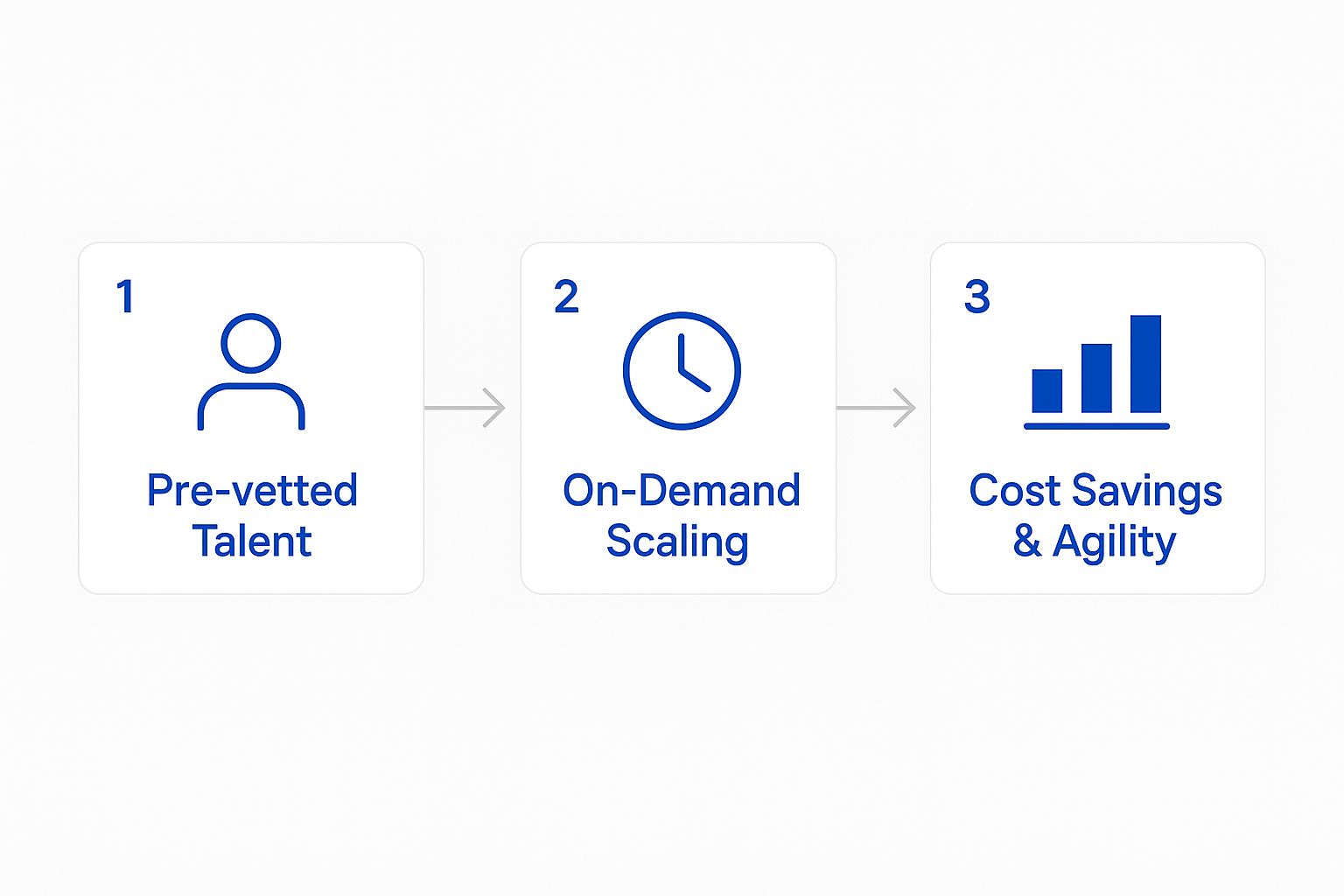So, what exactly is a customer service staffing agency?
Think of it as a specialist recruitment firm with a laser focus on finding, vetting, and placing professionals into customer support roles. They act as your on-demand talent pipeline, ready to supply skilled agents for temporary contracts or permanent positions.
The whole point is to sidestep the traditionally slow and expensive hiring marathon.
Why Businesses are Teaming Up with Staffing Agencies
For many UK businesses, building and maintaining a top-notch customer service team is a real headache. The old-school cycle of posting a job, wading through countless CVs, conducting interviews, and then onboarding can drain time and money.
It’s no surprise, then, that more and more companies are ditching this model in favour of a strategic partnership with a specialist customer service staffing agency.
An agency works like a flexible extension of your own business. Instead of being locked into a fixed, and often oversized, department, you can tap into a pool of expert talent precisely when you need it. This on-demand approach means you can scale your support team up or down in a flash, perfectly matching your business needs without the long-term overheads.

Tackling Critical Business Pain Points Head-On
This partnership model is built to solve some of the most persistent problems that get in the way of growth and customer happiness. An agency offers a direct solution to challenges like:
- High Employee Turnover: The customer service world is notorious for its high churn rate. Agencies give you a continuous pipeline of vetted professionals, so your support desk is never left scrambling.
- Seasonal Demand Spikes: Think of retailers during the Christmas rush or travel companies in the summer. An agency lets you instantly bring in trained staff to handle the surge, keeping your service quality high.
- Finding Specialised Skills: Need an agent who knows their way around a specific piece of software or has deep industry knowledge? Finding them can be like looking for a needle in a haystack. Agencies maintain a diverse talent pool, making it much easier to find that perfect fit quickly.
This kind of strategic flexibility is fast becoming a necessity. In fact, the UK staffing market is projected to grow by 4.3% by 2025, driven by this exact demand for agile solutions.
And with a staggering 57% of UK employees thinking about leaving their jobs because they feel undervalued, the ability to quickly backfill roles is more critical than ever to keep things running smoothly. You can explore more insights on UK staffing trends to get a fuller picture of the changing landscape.
By offloading the recruitment grind, companies can free up their internal teams to focus on what they do best. It transforms customer service from a costly operational line item into a real competitive edge.
The Strategic Value of a Specialist Agency
Bringing a specialist agency on board is about so much more than just filling an empty seat. Think of it as a strategic move that can completely reshape how you manage customer support, turning it from a reactive cost centre into a proactive, agile part of your business. The real magic lies in getting instant access to a deep pool of talent—people who have already been carefully checked and approved.
This is often a level of talent that’s difficult to find through your own in-house recruitment efforts. A dedicated customer service staffing agency lives and breathes this world. They spend all their time building networks of skilled professionals, which means you get to skip the time-consuming and expensive grind of advertising roles, sifting through CVs, and conducting endless interviews.
Driving Efficiency Through Agility
One of the biggest wins here is the ability to scale your support team up or down at a moment's notice. Business is rarely a flat line; you have seasonal rushes, new product launches, or unexpected staff absences that create sudden, urgent gaps. An agency partnership lets you bring in skilled agents almost immediately to manage these peaks, all without the long-term financial burden of a permanent hire.
This kind of flexibility leads to some serious cost savings. When you engage temporary staff, you sidestep all the usual overheads that come with permanent employees, including:
- Recruitment Costs: Forget about paying for job board ads or tying up your internal team's time.
- Benefits Administration: The agency takes care of payroll, National Insurance, and pension contributions.
- Reduced Training Time: Agents typically arrive with the core skills and software experience they need, making the whole onboarding process much quicker.
This operational nimbleness ensures you're never overstaffed during the lulls or, worse, understaffed when you need all hands on deck.
The infographic below shows how this streamlined process creates real business value.

As you can see, it maps a clear line from using a pre-vetted talent pool to achieving on-demand scalability, which directly translates into cost savings and greater business agility.
To truly appreciate the difference, let's look at the numbers side-by-side.
In-House Hiring vs Agency Partnership: A Cost-Benefit Analysis
This comparison makes it clear: while in-house hiring offers direct control, an agency partnership provides a level of financial and operational flexibility that is hard to match. It’s a trade-off between long-term investment and on-demand efficiency.
A Competitive Edge in Customer Experience
At the end of the day, this is all about keeping your customer care standards consistently high. When your team can adapt to fluctuating demand without missing a beat, your customers get the prompt, professional service they deserve. In fact, companies that embrace flexible staffing often report higher levels of both productivity and efficiency.
By giving you access to experienced talent exactly when you need it, a staffing agency helps you protect your brand's reputation and build customer loyalty, even when the pressure is on.
This approach also protects your core team from being stretched too thin, which is a surefire way to cause burnout and low morale. Instead of constantly putting out recruitment fires, your managers can finally focus on the bigger picture—the strategic projects that actually grow the business. An agency partnership isn't just a hiring fix; it’s a core part of building a resilient, customer-first business strategy. You gain the power to respond to market shifts swiftly, turning potential support headaches into chances to delight your customers and pull ahead of the competition.
How Top Agencies Find and Vet Talent
Finding truly great customer service talent isn't a simple case of posting a job advert and hoping for the best. A top-tier customer service staffing agency runs a finely tuned, multi-stage process designed to unearth not just skilled candidates, but the right people for your company’s unique culture and needs. It’s a system built for speed, precision, and quality.
It all kicks off with smart recruitment technology. Agencies use advanced applicant tracking systems and AI-powered matching tools to sift through enormous talent pools. These aren't just scanning for keywords on a CV; they're analysing past experience, specific skill sets, and even personality indicators to build a shortlist of people who genuinely fit the bill.

This tech-first approach puts the initial sourcing phase into hyperdrive. In 2024, agencies using AI filled roles in just 19 days on average—a world away from the UK's general average of a lengthy 42 days. That kind of speed is a game-changer for keeping your service levels consistent, especially in roles with high turnover. You can discover more about how AI is reshaping UK staffing trends and making this efficiency possible.
The Human Touch in a Multi-Stage Process
While technology casts a wide net, it’s the human expertise that makes the final, crucial decisions. Once the initial shortlist is ready, candidates move into a rigorous vetting process that puts both their hard and soft skills to the test.
- Initial Screening: This is the first conversation, where an experienced recruiter checks off the basics—confirming qualifications, getting a feel for their communication style, and making sure they’re genuinely interested.
- In-Depth Behavioural Interview: Here, things get serious. Recruiters use situational questions to dig into a candidate's history, asking how they've actually handled tricky customers, solved tough problems, and collaborated with a team.
- Soft Skill Assessments: Empathy, patience, and creative problem-solving are the bedrock of good customer service. Agencies use purpose-built assessments and role-playing exercises to see how candidates perform under pressure.
This structured approach makes sure that only people with a true customer-first attitude and real emotional intelligence make it through. It’s about finding individuals who can think on their feet, not just read from a script.
Technical Proficiency and Final Checks
The last few steps are all about confirming technical skills and making sure everything is above board. Candidates are tested on their ability to use the tools of the trade.
- Software Proficiency Tests: This involves hands-on assessments with common CRM platforms like Salesforce or HubSpot, and ticketing systems such as Zendesk or Freshdesk.
- Typing Speed and Accuracy: It might sound basic, but these tests are critical for ensuring agents can handle live chats and emails without a hitch.
Finally, the agency takes care of all the essential compliance and background checks. This means confirming the right-to-work status in the UK and running any required criminal record or reference checks. Our guide on effective pre-employment screening dives deeper into why this step is so vital for your peace of mind.
By handling this entire process from start to finish, the agency delivers fully vetted, technically capable, and compliant professionals who are ready to hit the ground running.
Picking the Right UK Staffing Partner
Finding the right agency to bring in your customer service talent is a massive decision, and it’s about so much more than just comparing price lists. Think of the right partner as a genuine extension of your own team. Get it wrong, and you could be creating more problems than you solve. To make the best choice, you need to be methodical and really understand what separates a great customer service staffing agency from a merely average one.
The first thing to look at is their industry specialisation. A generalist agency might be able to find bodies to fill seats, but a specialist who lives and breathes your sector—whether that’s tech, retail, or finance—will find people who already speak your customers' language. They get the unique challenges and the compliance headaches, which means you get a much, much better fit.
Look for Real Proof of Quality
Don't just rely on a slick sales pitch. You need to see concrete evidence that they know what they're doing and have a solid track record to back it up. A reputable agency will have nothing to hide and should be more than happy to show you their successes.
Here’s what to ask for:
- Client Testimonials and Case Studies: What are their current and past clients saying? Hunt for detailed stories that show a clear problem, the agency’s solution, and the results they actually delivered.
- Candidate Training Programmes: What’s their approach to keeping their talent sharp? Do they offer ongoing training on new software, communication skills, or industry updates? This tells you they’re invested in quality, not just filling roles.
- Sample Candidate Profiles: Ask to see a few anonymised profiles of the kind of people they’d put forward for your roles. It’s a direct window into the quality of talent they can actually access.
A strong history of happy clients and well-supported agents is one of the best signs you've found a partner you can trust.
Get into the Nitty-Gritty
Once you're confident in their expertise and track record, it's time to look at how the partnership will actually work day-to-day. The service level agreement (SLA) is your most important document here; it should spell out exactly what’s expected from everyone. This is where you iron out the details that make for a smooth, productive relationship.
A well-defined SLA is your blueprint for success. It removes ambiguity and sets clear, measurable standards for performance, communication, and reporting, ensuring everyone is on the same page from day one.
Pay close attention to these key areas:
- Communication Protocols: How will you stay in touch? What’s the expected response time when you have a question or an issue crops up? A clear plan here avoids a lot of frustration later on.
- Reporting Capabilities: What data will they share with you, and how often? You want a partner who provides detailed reports on agent performance, attendance, and other KPIs that matter to your business.
- Issue Resolution Process: Problems will happen; it's inevitable. What's the official process for sorting them out? A clear escalation path is vital for getting things fixed quickly and without fuss.
Making the right choice is a balancing act between industry knowledge, proven results, and operational clarity. For anyone exploring this option, you can learn more about the nuances of customer care outsourcing to build a truly solid strategy. By taking the time to properly evaluate these factors, you’ll find a customer service staffing agency that doesn’t just fill seats, but genuinely helps your business grow.
Navigating UK Compliance and Legal Duties
Bringing in new talent through a customer service staffing agency isn’t just about finding the right people; it’s a savvy move for navigating the notoriously complex world of UK employment law. Think of it as turning a potential legal minefield into a clear, manageable path.
A good agency acts as your compliance shield. They handle the administrative and legal heavy lifting that comes with hiring, protecting your business from the significant risks of accidental non-compliance. In a country with such specific employment regulations, this is a huge weight off your shoulders.
Key Compliance Areas Managed by Agencies
A professional agency takes several critical legal and financial duties off your plate. This frees up your team to focus on what they do best, rather than getting bogged down in administrative paperwork.
Here’s what they typically handle:
- PAYE (Pay As You Earn): The agency takes full responsibility for calculating income tax and National Insurance contributions, deducting them correctly, and paying HMRC on time.
- Pension Auto-Enrolment: They’ll manage the legal requirement to enrol eligible staff into a workplace pension, handling all the admin and contributions that go with it.
- Right-to-Work Checks: Verifying every candidate has the legal right to work in the UK is a strict legal requirement. Agencies perform these checks meticulously, shielding you from harsh penalties.
By taking care of these duties, the agency ensures every new team member is employed legally and ethically. It gives you complete peace of mind.
The Rise of Employer of Record Services
Many top agencies now go a step further by offering Employer of Record (EOR) services. In this setup, the agency becomes the legal employer of the staff, even though they are working on your projects. This is incredibly useful for businesses hiring remote workers across the UK without needing to set up a local office.
By acting as the Employer of Record, an agency takes on full legal responsibility for employment contracts, payroll, statutory benefits, and even GDPR compliance. It’s the safest, most straightforward way to build a flexible team while staying on the right side of the law.
This modern approach is becoming standard practice. As we head towards 2025, UK staffing agencies are leaning heavily on EOR models and robust compliance systems to help businesses manage ever-changing regulations. It’s a vital service, especially when you consider that 59% of UK businesses already rely on recruitment agencies to source talent. You can read more about how staffing agencies in the UK are evolving to keep up.
At the end of the day, partnering with a compliant staffing agency means you get all the benefits of a skilled, flexible workforce without the administrative headaches and legal risks.
Weaving Agency Talent into Your Team's Fabric
Finding great talent through a customer service staffing agency is a brilliant first move. But the real magic happens when you make those new professionals feel like they truly belong. A thoughtful integration process is what turns a good hire into a motivated, high-performing team member and ensures the partnership thrives long-term.
Think of it this way: their first few days aren't just about getting system logins. It's their immersion into your company's world. This is your chance to share your brand's origin story, get them excited about your core values, and explain what makes your approach to customer service special. When you treat agency staff like insiders from the get-go, they don't just answer tickets—they become genuine ambassadors for your brand.

Building Bridges, Not Silos
True integration lives and breathes in your daily communication. Firing off a few emails here and there just won't cut it. You need to build channels that spark real interaction and make your remote agency team feel plugged into the heart of the business.
Here are a few practical ways to get started:
- Create a Shared Digital Space: Set up a dedicated channel in Slack or Microsoft Teams for the entire customer service team—both your in-house people and the agency staff. This creates a central hub for quick questions, important updates, and a bit of team banter.
- Pull Up a Virtual Chair: Invite your agency professionals to relevant team meetings, planning sessions, and even company-wide virtual events. Giving them this visibility helps them grasp the bigger picture and feel like they’re contributing to shared goals.
- Give Them a Go-To Person: Pair each new agency agent with one of your permanent team members. This "buddy" becomes their friendly guide for all the informal, "I feel silly asking this" kind of questions.
This isn’t about managing a vendor; it’s about building a partnership. These simple steps can completely transform the dynamic.
Defining What "Good" Looks Like
To get great performance, you need to be crystal clear about your expectations. Ambiguity is the enemy of results. Sit down with your agency partner and agree on a set of transparent, measurable goals right from the start.
When agency professionals know exactly what success looks like—whether it’s hitting a certain first-response time, achieving a 95% customer satisfaction score, or resolving a specific number of queries per day—they’re empowered to own their work and drive your business forward.
Ultimately, integrating agency staff is all about your mindset. Don't see them as a temporary fix. See them for what they are: a skilled, flexible extension of your own team. For more ideas on getting this right, our guide on mastering remote employee onboarding is packed with strategies to make every new hire feel set up for success from day one.
Your Questions Answered
When you're thinking about bringing a customer service staffing agency on board, it's completely normal to have a few questions about how it all works. Let's walk through some of the most common ones that come up.
How Does the Pricing Actually Work?
Most agencies keep it simple with what’s called a 'bill rate'. Think of it this way: the agency pays the agent their hourly wage, and you pay the agency a slightly higher hourly rate for that agent's time.
That gap between what the agent earns and what you pay is the 'markup'. It’s not just profit; it’s what covers all the agency's overheads – things like the costs of finding and vetting candidates, national insurance contributions, payroll administration, and keeping their lights on.
If you’re hiring for a permanent role, you’ll usually see a one-time placement fee instead. Whatever the model, it's always a good move to ask for a clear, transparent breakdown of the costs before you sign anything.
Can We Offer a Temporary Agent a Permanent Job?
Yes, absolutely. This happens all the time and it’s usually called a 'temp-to-perm' arrangement. It’s a fantastic way to make sure someone is the right fit.
Your agreement with the agency will spell out the details. Typically, an agent needs to work a set number of hours with you as a temp before you can hire them directly without any extra fees. Sometimes, there's an option to pay a 'conversion fee' if you want to bring them onto your permanent team sooner.
This 'try before you buy' approach is a brilliant strategy. It gives you a real-world trial period to see if a candidate truly clicks with your team's culture and daily rhythm before you commit to a permanent offer.
Who Is Responsible for Managing the Agent's Performance?
This is a classic partnership – a shared responsibility. You handle the day-to-day stuff. That means you'll be the one assigning their tasks, guiding their work, and giving them the direct feedback they need to succeed in their role with your company.
But, the agency is still their official employer. They take care of all the formal HR heavy lifting. If a performance issue crops up that you can't resolve, you flag it with the agency. They’ll then step in to manage any formal corrective action, or even termination, making sure everything is handled correctly according to UK employment law.

